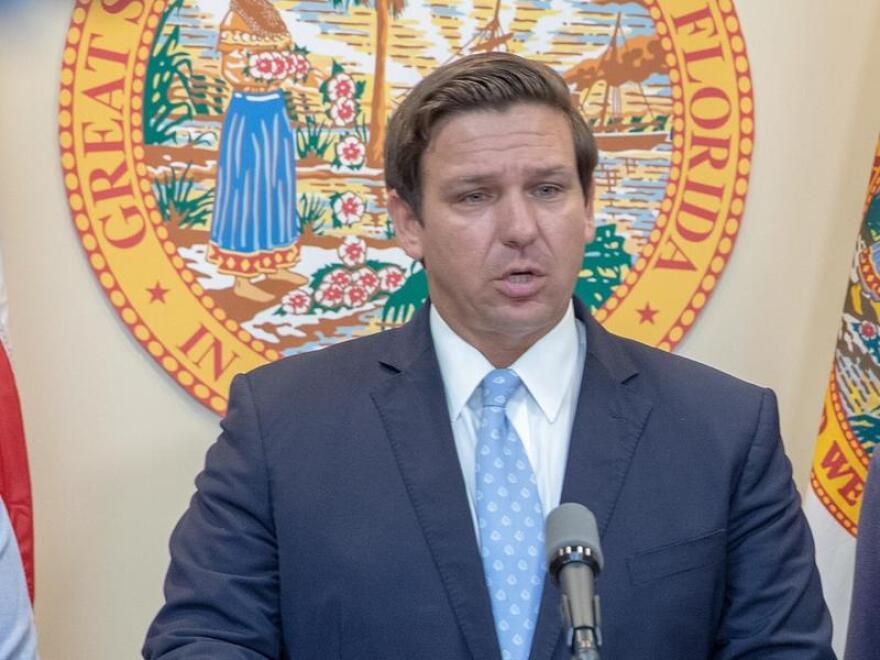Gov. Ron DeSantis is asking lawmakers for a $285 million increase in public-school funding in the coming year and to keep tuition rates flat for college and university students --- a potentially stark contrast to what House and Senate budget leaders have signaled could be coming.
DeSantis on Thursday released an overall $96.6 billion budget proposal for the 2021-2022 fiscal year under the slogan “Florida Leads,” offering a rosy outlook on the state’s financial future. The rollout came as lawmakers brace to negotiate a budget amid a roughly $2 billion shortfall brought on by COVID-19.
DeSantis’ requests would bring K-12 funding to a record high of $22.8 billion and raise per-student funding by $233 to $8,019.
“Last year’s budget, current fiscal year, Florida led on education,” DeSantis said during a news conference in the Capitol. “I think we’re going to continue that momentum, we’re going to continue to lead going forward.”
In higher education, the governor is asking lawmakers to keep operating funds for Florida’s universities the same at $2.7 billion and reduce operating funds for state colleges by $100 million to $1.2 billion.
“We do not any allow tuition increases,” at higher education institutions, DeSantis said of his plan.
The governor’s comment came after Senate President Wilton Simpson, R-Trilby, told reporters in November that tuition hikes are a “viable opportunity” heading into the 2021 legislative session, which starts March 2.
House Speaker Chris Sprowls, R-Palm Harbor, told reporters during an online news conference Thursday he had not reviewed the governor’s proposal.
“We’re happy to take the governor’s input and his recommendations and vet that through the committee process and build it into the puzzle that is our very large, very complicated state budget,” Sprowls said.
House and Senate leaders have warned in recent weeks that education spending cuts will be inevitable as they craft a budget during the upcoming session for the fiscal year that starts July 1. They have pointed to issues such as increased costs in Medicaid, which has seen its enrollment soar during the pandemic as residents have turned to the program for health care.
“Every dollar we spend for Medicaid has to be taken out from some other department. So, we’re concerned about that,” Senate Education Appropriations Chairman Doug Broxson, R-Gulf Breeze, said Jan. 13. “Let me just say, education will have to have some cuts, between K-12 and higher ed, and that’s the reality.”
House Appropriations Chairman Jay Trumbull, R-Panama City, echoed the sentiment during a committee meeting in mid-January.
“It is mathematically impossible to cut $2 billion out of this budget without taking anything from education, obviously, due to the fact that recurring (general revenue) represents a significant amount of our budget,” Trumbull said.
DeSantis on Thursday said federal stimulus money earmarked for education, in part, will help avoid cuts. Also, much of the $285 million in increased funding for the Florida Education Finance Program --- the main funding source for public schools --- would come from increased local property-tax revenue, not state dollars. That increased revenue would stem from higher property values.
“For those who were saying education is going to get whacked, I think we’ve shown, no; not only in terms of our budget, but also in some of the other things you’re going to see with federal funds,” the governor said.
DeSantis’ proposed budget followed through on Education Commissioner Richard Corcoran’s promises that teacher pay raises approved by lawmakers during the 2020 session would be protected. The governor’s proposal includes an increase of $50 million for teacher raises, which would come on top of $500 million approved during the 2020 session.
“This budget builds off that success,” DeSantis said, referring to last year’s approval of pay raises.
But in trying to save money, the proposal would provide no new funding for the Schools of Hope program, which Corcoran touted in his previous role as House speaker. The program is designed to lead to charter schools serving children who have been in low-performing traditional public schools. DeSantis’ staff said a substantial amount of unused money can be carried forward to keep the program operating.
To combat what he has repeatedly said will be a lasting effect of the pandemic, DeSantis also wants an additional $10 million for mental-health initiatives in schools.That would bring the total to $110 million.
“Although Florida opened schools, although we had activities over the summer --- kids are much happier here than in some of these other parts of the country --- there’s going to be mental health fallout even under the best of circumstances,” DeSantis said. “So we want to be ready for that.”
The Florida Education Association statewide teachers union, which has frequently clashed with DeSantis, issued a statement Thursday that was titled, “It’s now up to legislators to protect Florida’s schools and students.”
“We realize that this is going to be a tight budget year, but now is not the time to divert any funding from our public schools,” union President Andrew Spar wrote, adding later in his statement that “our lawmakers need to step up and not only protect but enhance funding for our public schools. For the good of our state and our students, public education must be well-positioned as we start coming out of this pandemic.”




